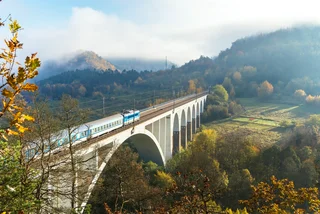České dráhy, the state railway operator, has announced that fares will increase by an average of 15 percent from Dec. 11. For some tickets, the rises will be over 30 percent, as reported in ČT24.
Price increases will apply to standard tickets (“kilometer tariffs”) as well as the “One Ticket” unified tariff system (“systém jednotného tarifu" – SJT), in which tickets can be used on all almost all trains in Czechia, regardless of the carrier.
PARTNER ARTICLE
Standard tickets whose costs are based on journey distance in kilometers, or the so-called kilometer tariff, will rise by an average of 15 percent, according to Petr Šťáhlavský, spokesperson for České dráhy.
The price of a České dráhy ticket that covers a distance of about 10 kilometers will rise from CZK 27 to 31. A journey of about 45 kilometers will now cost CZK 92, from CZK 78 previously. A 100-kilometer journey (roughly from Prague to Pilsen) will rise by CZK 25, to CZK 188.
The SJT tariff, which covers the vast majority of trains in the country irrespective of the carrier, will also increase by a set 15 percent according to František Jemelka, a spokesperson for the Ministry of Transport.
The prices of special-purpose, seasonal tickets – such as a seven-day summer ticket – will also rise. Multi-day holiday tickets will increase by as much as 50 percent: the price of a weekly summer ticket will rise from CZK 890 to CZK 1,390, and the price of the 14-day option will shoot up from CZK 1,290 to CZK 1,990.
Discount-based travel cards will also increase in price. A three-month “IN 25” card, which offers a 25 percent discount on flexible-fare tickets, will see a significant 30 percent increase: from CZK 190 to CZK 250. The “IN 100” card, which offers unlimited travel on any České dráhy train (in second class) will increase by CZK 2,000 from the current price of CZK 19,990.
Reasons for the increase
Spokesman Jemelka attempted to defend the price increase, referring to the current state of national inflation, which stands at 18 percent.
“We are trying to keep fare price increases below inflation, even though costs that are key to transportation have risen much more than average inflation," he said, as reported by ČTK.
"We must keep public transport available for passengers and gradually restore the fleet and improve the railway infrastructure and passenger services," he added.
Šťáhlavský of České dráhy similarly contextualized the price increase. According to him, the absence of revaluing some tickets in the past decade explains big jumps in price. “In some cases, these amounts [current prices] have not been valued since 2010,” he said.
Tickets purchased before price increase will not change
People have until Dec. 11th to make the most of current, cheaper prices. Notably, multi-month travel options that are purchased before Dec. 11th will still incorporate their current price discounts going into 2023.
A quarterly ticket purchased in early December, for example, allows for travel at its current price offering until March next year.












 Reading time: 2 minutes
Reading time: 2 minutes 



























